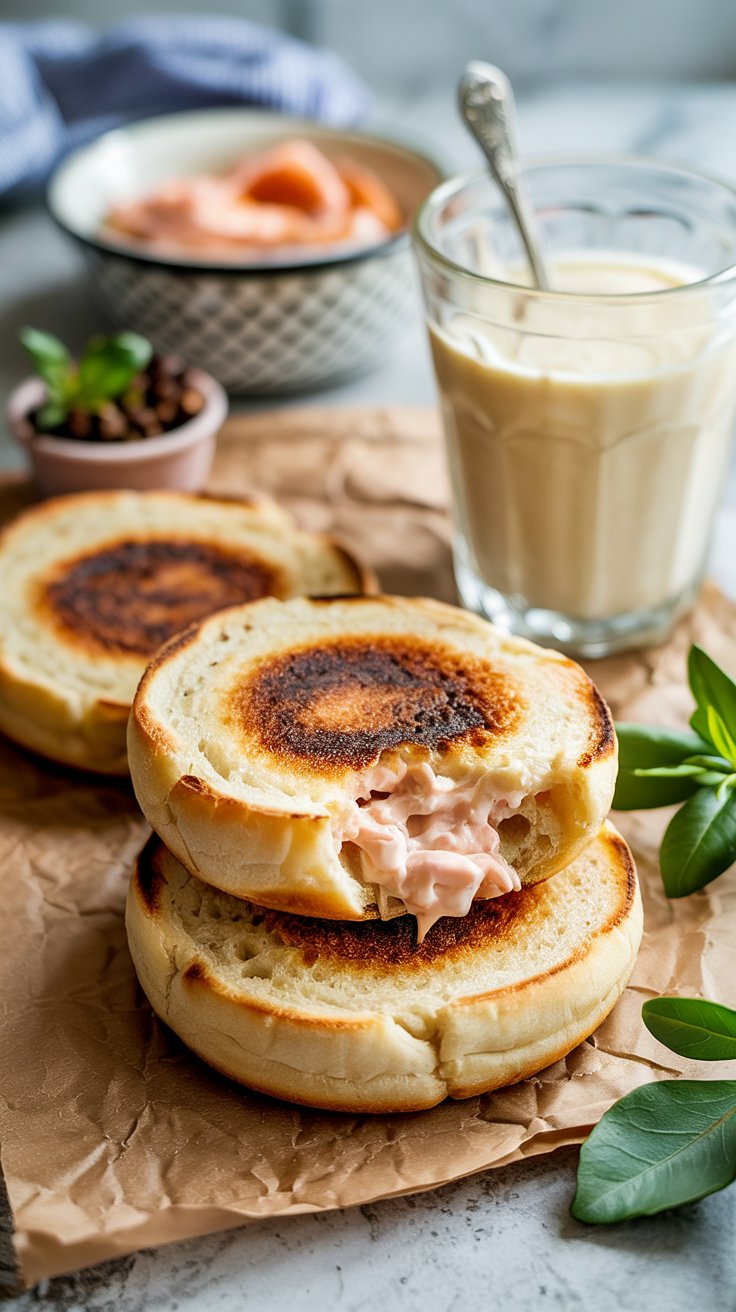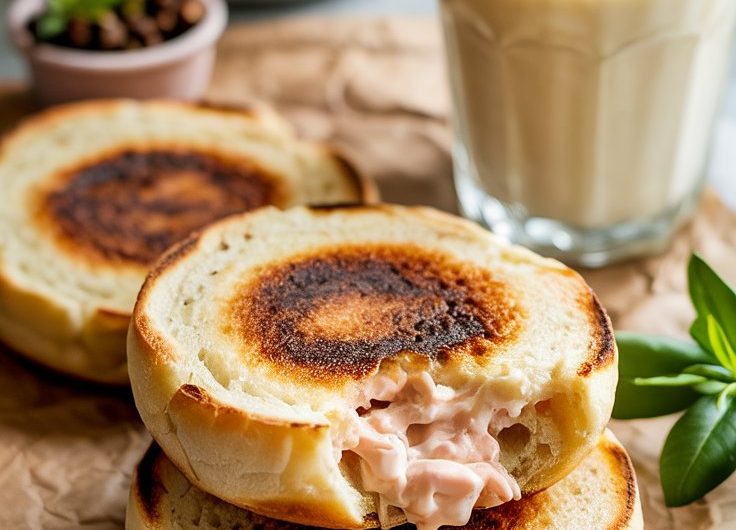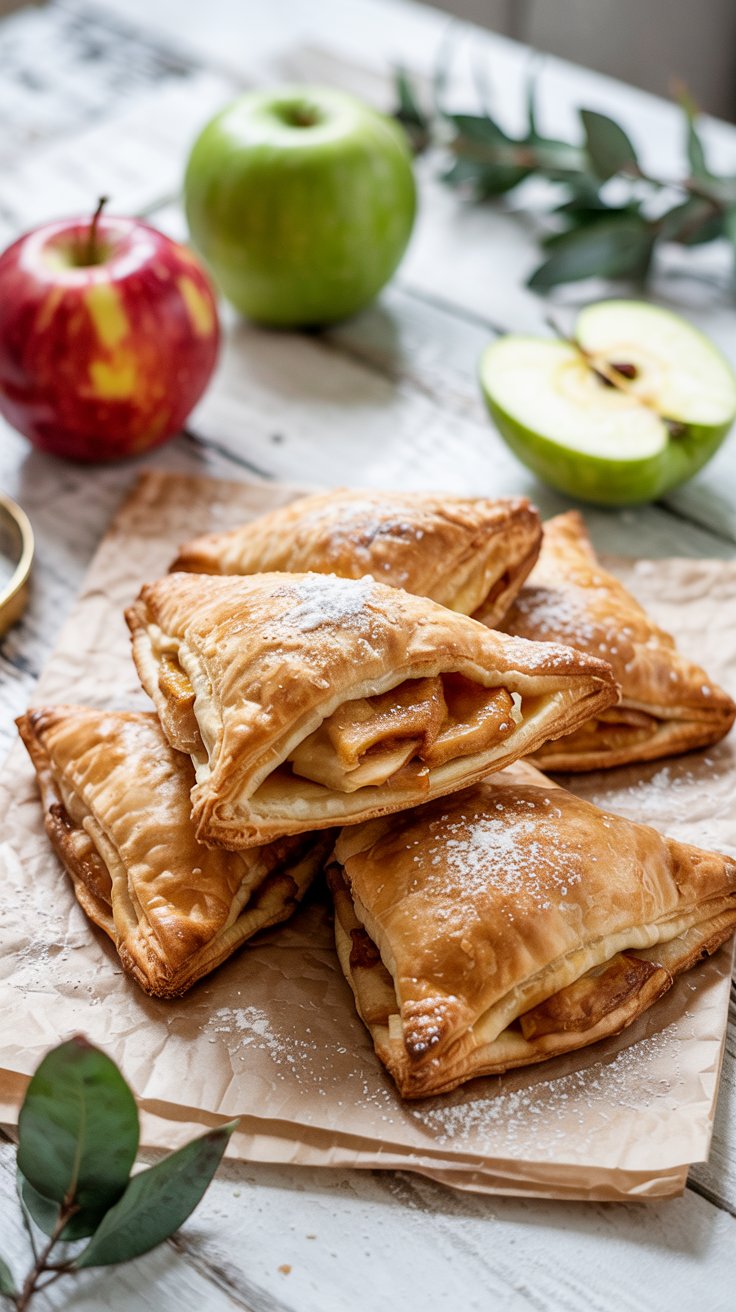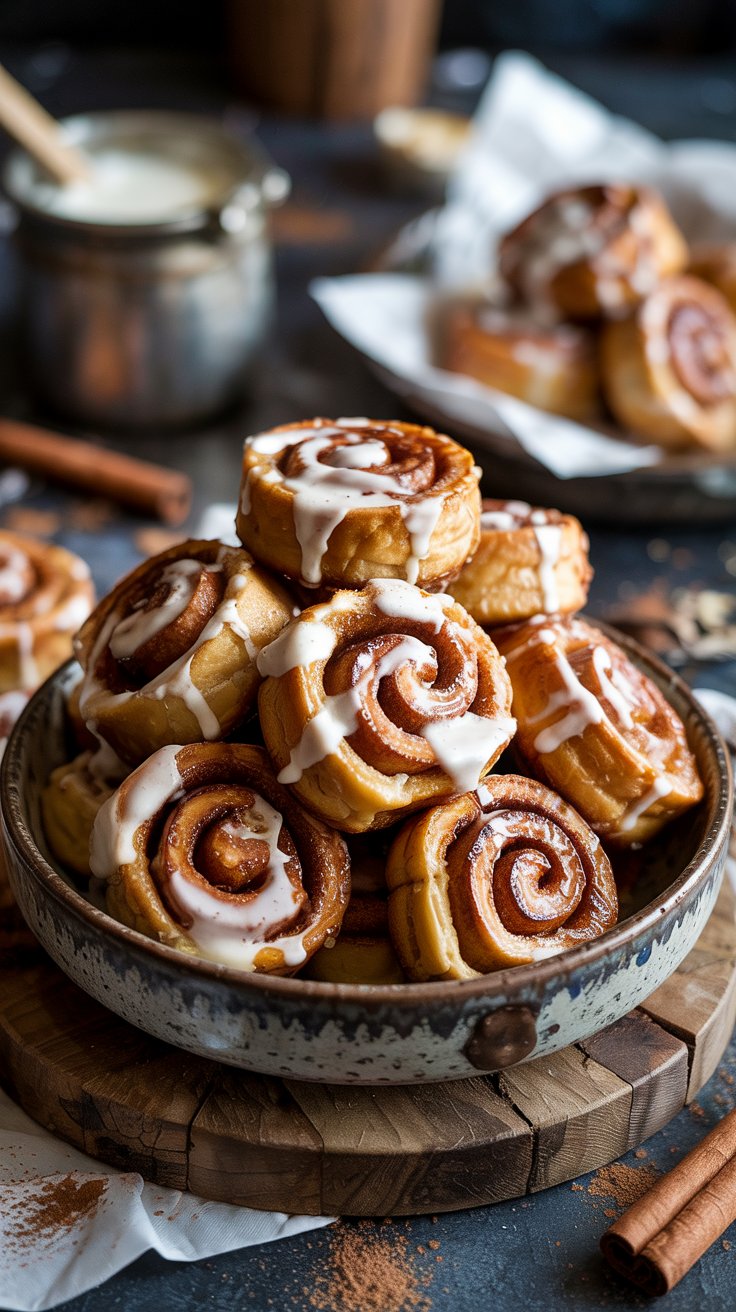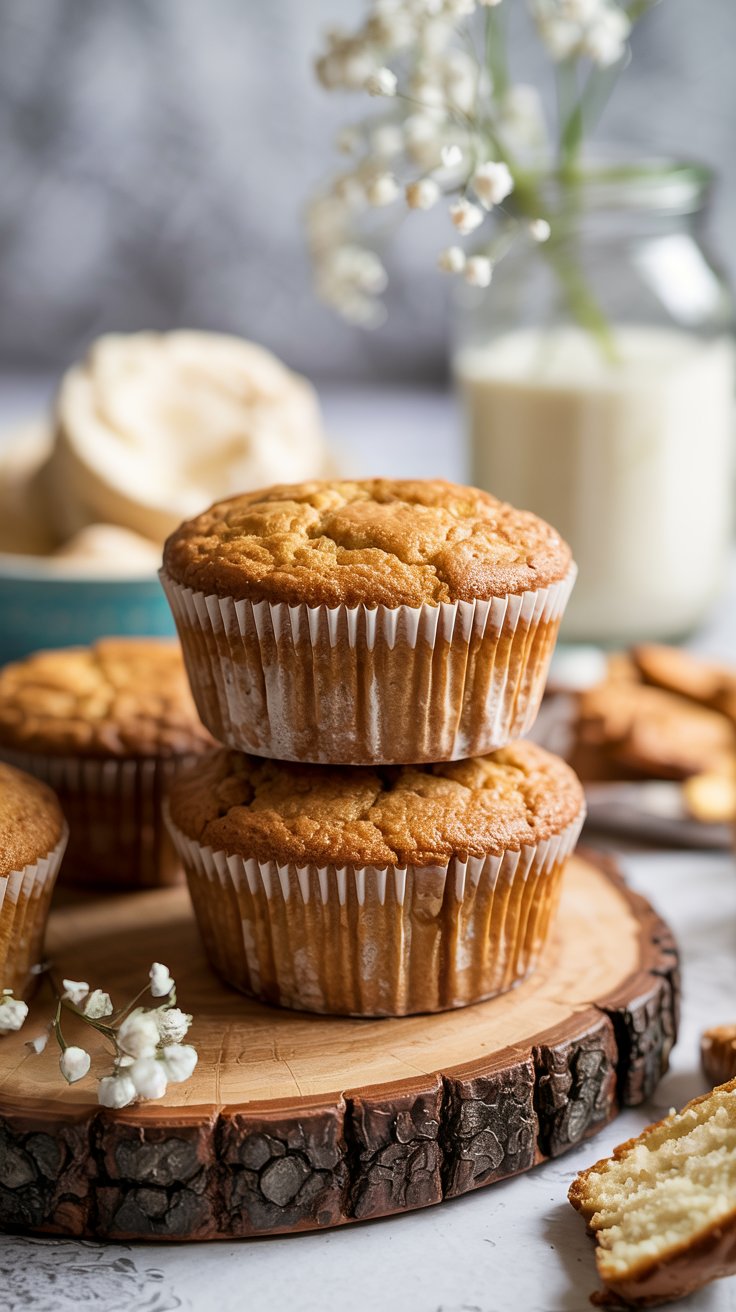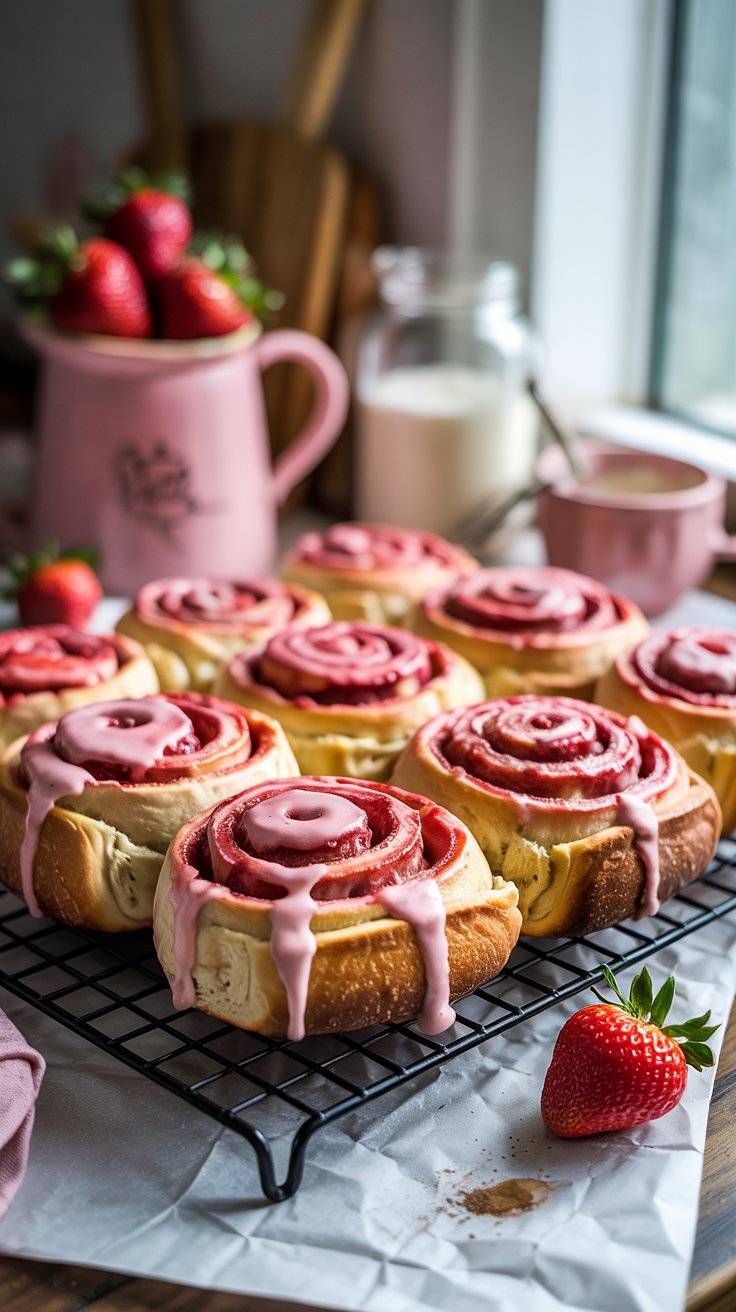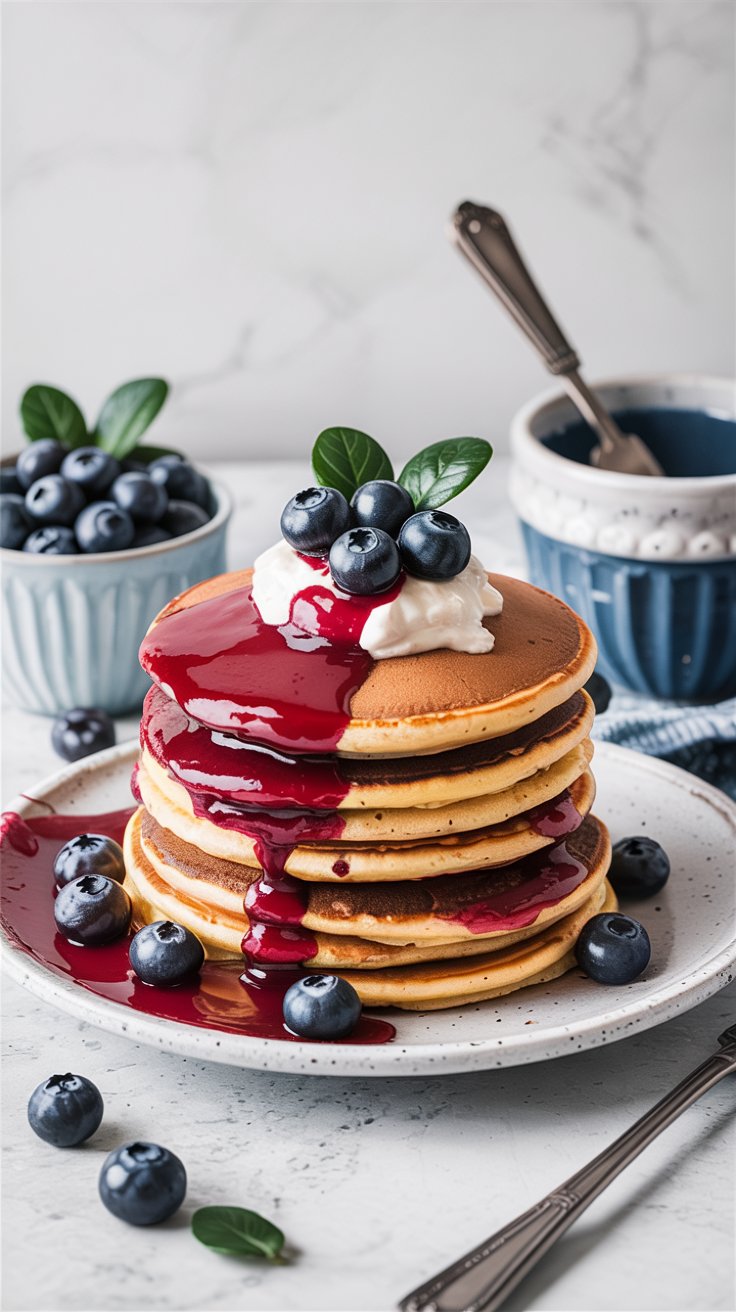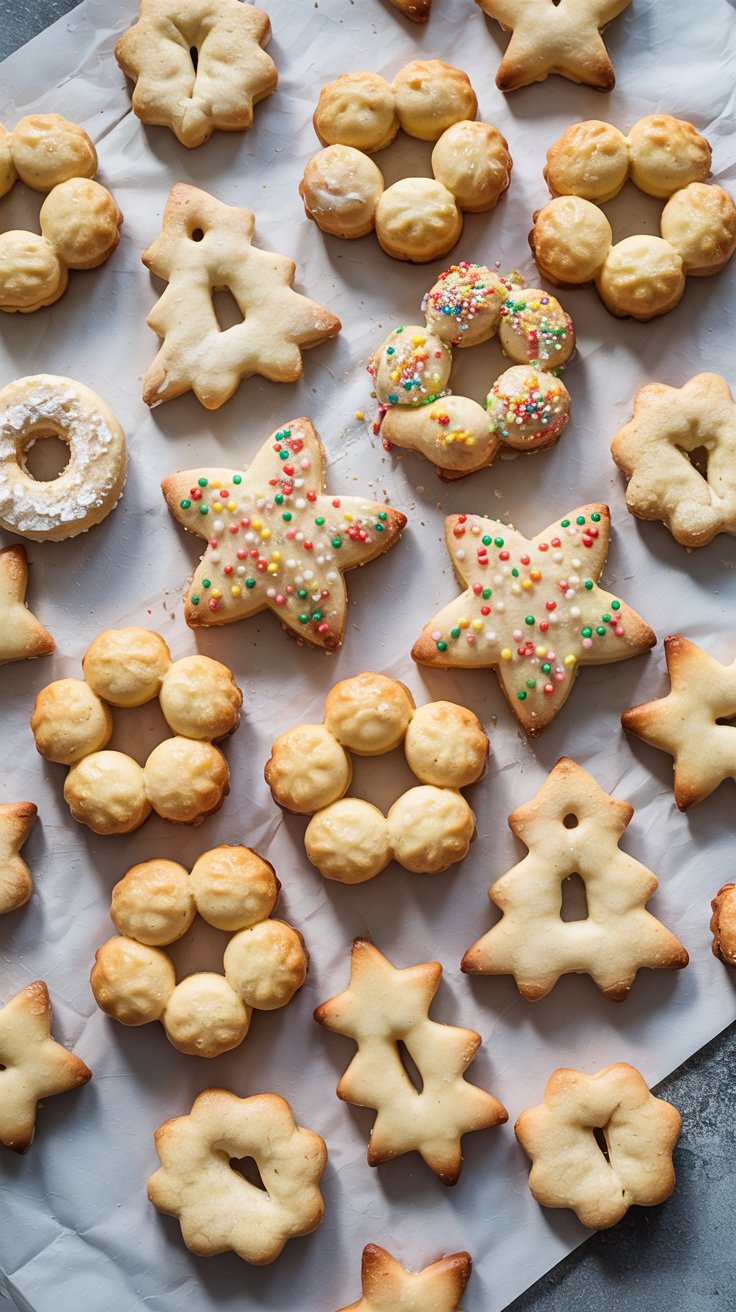Homemade English Muffins
If you’ve ever wanted to try baking something cozy and simple, Homemade English Muffins are a great place to start. They’re humble, light, and gently chewy, with that cornmeal-dusted exterior and the promise of butter melting into those craggy little pockets. These muffins cook on the stovetop, which feels friendly somehow. You can start the dough in the afternoon, tidy the kitchen while it rises, and by the time you’re craving a snack, you’ve got warm, golden rounds ready to split and toast. No big fuss, just honest, everyday baking.
Ingredients for this Homemade English Muffins
- 3 1/2 cups (420 g) bread flour or all-purpose flour, plus more for dusting
- 1 cup (240 ml) warm milk, about 110°F
- 1/2 cup (120 ml) warm water, about 110°F
- 2 teaspoons instant yeast (or active dry yeast)
- 2 tablespoons granulated sugar
- 1 1/2 teaspoons fine sea salt
- 2 tablespoons unsalted butter, melted and slightly cooled
- 1 large egg, room temperature (optional, for a richer muffin)
- Cornmeal, for dusting
- Neutral oil or softened butter, for greasing
Notes:
- If using active dry yeast, proof it first in the warm water with a pinch of sugar until foamy, 5–10 minutes.
- Dairy-free: use unsweetened plant milk and swap butter for 2 tablespoons neutral oil.
Instructions
- Activate the yeast (if using active dry): In a small bowl, mix warm water with a pinch of sugar and the yeast. Let it sit until creamy and foamy. If using instant yeast, skip this step and add it directly to the flour later.
- Make the dough: In a large mixing bowl (or the bowl of a stand mixer), whisk flour, sugar, salt, and instant yeast if using. Add warm milk, the foamy yeast mixture (or the warm water if you used instant yeast), melted butter, and egg if using. Stir with a wooden spoon until a shaggy dough forms.
- Knead: Knead by hand on a lightly floured surface for about 8–10 minutes, or 6–7 minutes on medium with a dough hook. The dough should be soft and slightly tacky but not sticky. If it’s clinging, dust sparingly with flour. Try not to overdo it, or the muffins turn dense.
- First rise: Shape the dough into a smooth ball and place it in a lightly oiled bowl. Cover with a clean towel or plastic wrap and let it rise in a warm, draft-free spot until doubled, about 60–90 minutes. A gentle poke should leave a slow spring-back.
- Shape the muffins: Dust a baking sheet generously with cornmeal. Turn the dough out onto a lightly floured counter and pat it into a thick rectangle, about 3/4 inch thick. Use a 3-inch cutter or a drinking glass to cut rounds. Gently re-roll scraps and cut again. Set each round on the cornmeal, then sprinkle more cornmeal on top. You should get 10–12 muffins.
- Second rise: Cover the rounds with a towel and let them puff for 20–30 minutes until slightly risen and pillowy. They should feel airy when you lift one, but not so fragile they collapse.
- Preheat the griddle: Heat a heavy skillet or griddle over low to medium-low heat. Lightly grease with butter or oil, then wipe out excess so it’s just a thin film. Patience here helps prevent scorching.
- Cook low and slow: Place muffins on the griddle, leaving space between them. Cook 7–9 minutes per side, turning once, until deeply golden with a firm crust. If they’re browning too fast, lower the heat. You can cover the pan for the first few minutes to help the centers cook through. Internal temp should be around 200°F when done. Listen for that soft hiss as they cook… it’s a good sign.
- Optional oven finish: If the outsides are perfect but the centers need a bit more, slide the muffins onto a baking sheet and finish in a 350°F oven for 8–10 minutes.
- Cool and split: Let muffins cool on a rack at least 15 minutes. To get those famed nooks and crannies, use a fork to poke around the edge, then gently pull apart rather than slicing with a knife. Toast and serve with butter, jam, or a fried egg. Breakfast, sorted.
Tip: Resist flattening the muffins on the griddle. They’ll rise and set on their own, and pressing can squash the crumb.
Cook and Prep Times
- Active prep: 25 minutes
- First rise: 60–90 minutes
- Second rise: 20–30 minutes
- Stovetop cook: 20–25 minutes total
- Optional oven finish: 8–10 minutes
- Total time: About 2 hours 20 minutes to 2 hours 40 minutes
- Yield: 10–12 muffins
Nutritional information
Estimated per muffin (12 muffins, with egg and butter):
- Calories: ~180
- Carbohydrates: ~32 g
- Protein: ~6 g
- Fat: ~3 g
- Fiber: ~1–2 g
- Sodium: ~260 mg
These are estimates and will vary based on specific ingredients and size.
Frequently asked questions
How do I get the classic “nooks and crannies” texture?
A slightly wetter dough is your friend. Don’t over-flour during kneading. Let both rises happen fully so the dough is airy. After cooking, always split with a fork instead of slicing with a knife. The fork teases apart the crumb, creating those lovely pockets that grab butter like it’s their job.
Can I make Homemade English Muffins ahead or freeze them?
Once cooked and cooled, store at room temperature in an airtight bag for up to 2 days. For longer storage, freeze up to 2 months. Split them first, then freeze. That way you can pop the halves straight into the toaster from frozen. If prepping the night before, you can also shape the muffins, cover, and chill overnight. Let them sit at room temp 30–45 minutes before cooking so they puff up.
Do I need bread flour, or will all-purpose flour work?
Both work. Bread flour gives a slightly chewier texture and a bit more rise. All-purpose keeps them tender and soft. If your dough feels very slack with all-purpose, add a tablespoon or two of flour as you knead, just enough so it doesn’t glue itself to your hands. Still, err on the sticky side. That moist dough equals better texture.
Homemade English Muffins
12
servings25
minutes25
minutes180
kcalIf you’ve ever wanted to try baking something cozy and simple, Homemade English Muffins are a great place to start. They’re humble, light, and gently chewy, with that cornmeal-dusted exterior and the promise of butter melting into those craggy little pockets. These muffins cook on the stovetop, which feels friendly somehow. You can start the dough in the afternoon, tidy the kitchen while it rises, and by the time you’re craving a snack, you’ve got warm, golden rounds ready to split and toast. No big fuss, just honest, everyday baking.
Ingredients
3 1/2 cups (420 g) bread flour or all-purpose flour, plus more for dusting
1 cup (240 ml) warm milk, about 110°F
1/2 cup (120 ml) warm water, about 110°F
2 teaspoons instant yeast (or active dry yeast)
2 tablespoons granulated sugar
1 1/2 teaspoons fine sea salt
2 tablespoons unsalted butter, melted and slightly cooled
1 large egg, room temperature (optional, for a richer muffin)
Cornmeal, for dusting
Neutral oil or softened butter, for greasing
Instructions
- Activate the yeast (if using active dry): In a small bowl, mix warm water with a pinch of sugar and the yeast. Let it sit until creamy and foamy. If using instant yeast, skip this step and add it directly to the flour later.
- Make the dough: In a large mixing bowl (or the bowl of a stand mixer), whisk flour, sugar, salt, and instant yeast if using. Add warm milk, the foamy yeast mixture (or the warm water if you used instant yeast), melted butter, and egg if using. Stir with a wooden spoon until a shaggy dough forms.
- Knead: Knead by hand on a lightly floured surface for about 8–10 minutes, or 6–7 minutes on medium with a dough hook. The dough should be soft and slightly tacky but not sticky. If it’s clinging, dust sparingly with flour. Try not to overdo it, or the muffins turn dense.
- First rise: Shape the dough into a smooth ball and place it in a lightly oiled bowl. Cover with a clean towel or plastic wrap and let it rise in a warm, draft-free spot until doubled, about 60–90 minutes. A gentle poke should leave a slow spring-back.
- Shape the muffins: Dust a baking sheet generously with cornmeal. Turn the dough out onto a lightly floured counter and pat it into a thick rectangle, about 3/4 inch thick. Use a 3-inch cutter or a drinking glass to cut rounds. Gently re-roll scraps and cut again. Set each round on the cornmeal, then sprinkle more cornmeal on top. You should get 10–12 muffins.
- Second rise: Cover the rounds with a towel and let them puff for 20–30 minutes until slightly risen and pillowy. They should feel airy when you lift one, but not so fragile they collapse.
- Preheat the griddle: Heat a heavy skillet or griddle over low to medium-low heat. Lightly grease with butter or oil, then wipe out excess so it’s just a thin film. Patience here helps prevent scorching.
- Cook low and slow: Place muffins on the griddle, leaving space between them. Cook 7–9 minutes per side, turning once, until deeply golden with a firm crust. If they’re browning too fast, lower the heat. You can cover the pan for the first few minutes to help the centers cook through. Internal temp should be around 200°F when done. Listen for that soft hiss as they cook… it’s a good sign.
- Optional oven finish: If the outsides are perfect but the centers need a bit more, slide the muffins onto a baking sheet and finish in a 350°F oven for 8–10 minutes.
- Cool and split: Let muffins cool on a rack at least 15 minutes. To get those famed nooks and crannies, use a fork to poke around the edge, then gently pull apart rather than slicing with a knife. Toast and serve with butter, jam, or a fried egg. Breakfast, sorted.

